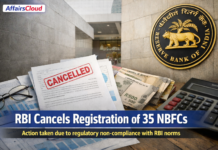 The Securities and Exchange Board of India (SEBI) has issued guidelines for the participation of Mutual Fund (MF) schemes in Interest Rate Swaps (IRS).
The Securities and Exchange Board of India (SEBI) has issued guidelines for the participation of Mutual Fund (MF) schemes in Interest Rate Swaps (IRS).
What is an Interest rate swap(IRS)?
An IRS is the exchange of future interest payments between two parties based on a specified principal amount to hedge against interest rate losses.
SEBI’s Guidelines to MF:
i.SEBI allowed MFs to enter into plain vanilla IRS for hedging purposes, but the value of the notional principal in such cases must not exceed the value of respective existing assets being hedged by the scheme.
- Plain Vanilla IRS: It is the most common and simplest swap in which two parties agree to a predetermined, fixed rate of interest on a notional principal on specific dates for a specified period of time.
ii.If the MF is entering into the IRS through counter transactions, the counterparty has to be an entity recognized as a market maker by Reserve Bank of India (RBI).
iii.The exposure to a single counterparty in counter transactions should not exceed 10 percent of the net assets of the scheme.
iv.The 10 percent limit for a single counterparty is not applicable for the IRS by MF through an electronic trading platform offered by the Clearing Corporation of India Ltd (CCIL).
Note -Credit Default Swaps (CDS) was the 1st IRS, it occurred between IBM and the World Bank in 1981.
-SEBI Issued Framework for Supervisory Body of IAs
On June 18, 2021, SEBI issued frameworks for the Investment Adviser Administration and Supervisory Body (IAASB).
i.As per SEBI’s norms, it may recognise anybody or body corporate for the purpose of regulating IAs. An entity granted recognition under the investment advisers (IAs) rules by SEBI will be designated as – IAASB, and it will be allowed to administer and supervise the IAs.
ii.Those IAASB need to supervise IAs (both onsite and offsite), redress grievances of clients and IAs, take administrative action (including issuing warning), and have to refer SEBI for enforcement action.
iii.The board of the IAASB has to be chaired by a Public Interest Director and it also needs to have a director to bring perspective to investors.
iv.All the existing IAs have to seek membership of IAASB within 3 months of the recognition of IAASB by SEBI, and they have to submit periodic reports to IAASB.
Note – BSE Administration & Supervision Limited (BASL), a wholly-owned subsidiary of Bombay Stock Exchange (BSE) Limited, has been granted recognition from SEBI as IAASB for a period of 3 years from June 1, 2021. Click here to know more
Recent Related News:
On May 17, 2021, SEBI issued a Consultation Paper detailing the Proposed framework for the Gold Exchange in India and the draft SEBI (Vault Managers) Regulations, 2021 for regulating the gold exchange-related business of the Vault Managers.
About Securities and Exchange Board of India (SEBI):
Establishment – On April 12, 1992, in accordance with the Securities and Exchange Board of India Act, 1992.
Headquarters – Mumbai, Maharashtra
Chairman – Ajay Tyagi




